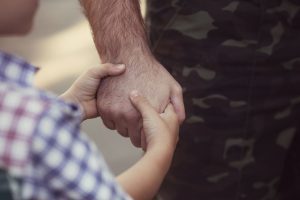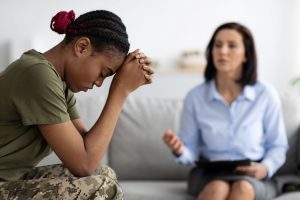Remembrance Day
On Remembrance Day, every year, we honour men and women that have made great sacrifices for their country and what they did for us as a nation. Remembrance Day offers an opportunity for reflection on the effects of war and the brave people who have served in the military and the families that supported them.
For men and women veterans that served in the military as well as the affected families, Armistice Day – also known as Remembrance Day – can bring multiple challenges and resurface traumatic memories. These memories can also invite feelings of upset, overwhelming emotions, unpleasant images, and deep sorrow for all those who were sadly lost during the war.
Veterans suffering from PTSD (Post Traumatic Stress Disorder) and signs of trauma will often experience their symptoms worsen on Remembrance Day.
If you have served in the military or you have family/friends you have supported through the military, asking for help, or seeking therapy can offer a safe space in which one can speak freely of experiences and emotions and receive support in coping and healing during this incredibly challenging time. If you are a veteran, contacting your GP will give you priority access to NHS healthcare treatments for any conditions, related to your services.
At Leone Centre we feel that is important to raise awareness and offer help to anyone finding this Remembrance Day a challenge.

Support for women veterans
The number of women veterans in the military increases every year. Research has found that only a small percentage of female veterans are seeking mental health treatments. There are indications that female veterans are at an increased risk when discharged from the military of mental health conditions developing. Key elements that can affect women in the military include gender discrimination, access barriers, not being recognised as a veteran, mental health stigma, and sexual harassment. Women veterans should not go unheard and we can offer support to any woman suffering in silence.
Symptoms of trauma and PTSD
Trauma and PTSD (post traumatic stress disorder) are generally formed due to extremely stressful past events that have occurred in a person’s life. This can include a number of experiences, no two persons experiences are the same, nor are their trauma / PTSD symptoms – each person will experience their own individual signs.
See the below symptoms associated with PTSD and trauma:
- Hyper-vigilance
- Flashbacks
- Unpleasant thoughts and images
- Generally feeling anxious and/or unsafe
- Disassociation
- Unusual sleep patterns / Nightmares
- Irritability or aggression
- Trouble expressing or receiving affection
- Feeling numb
- Struggle with focusing and concentrating
- Self-medicating
- Trouble concentrating on simple tasks
- Short temper or easily startled
- Addiction / Unhealthy coping mechanisms
Other symptoms associated with PTSD and trauma can include physical sensations such as pain, including headaches and chest pains, nausea, sweating, or trembling. As well as the physical signs, people can also experience hardships in everyday life such as holding down a job, looking after oneself, maintaining healthy friendships/relationships, low sex drive and/or lacking any enjoyment from everyday life.
According to Dr. Gabor Mate;
“Trauma is actually what happens internally to us. It happens on the body level, on the level of the psyche as a response to adverse external conditions.”
The trauma often results in suffering with PTSD, and other mental and physical health issues. In an attempt to resolve these issues, one often seeks relief in adaptive ways that have a negative impact on our relationships with ourselves, others, and the world around us.
Families and relationships
Families and relationships can be affected by war alongside the veterans fighting for their lives. The courage and bravery of the men and women who are fighting or have previously fought in the war is unspeakable. Understandably their partners, children, parents, and other friends and family members will experience a flood of emotions and feelings whilst being separated from their loved one and trying to cope without them present in everyday life. There is an intense relational depth between soldiers fighting and those they are fighting to protect. The families and other relationships can also be affected when their loved ones return home. It can invite anxiety and other mental health conditions when adapting to how that person will deal with and process the trauma they have experienced. It can bring many changes to a person when removed from a familiar environment, and sometimes lead to anxiety at the thought of going back.
Symptoms of trauma impacting relationships include:
- Feeling unsafe, even in home environments
- Feeling numb and lacking emotion
- Heightened emotions and outbursts
- Low sex drive
- Feeling insecure and unworthy
- Self-isolating
- Reluctant to trust others or open up
Talk with a therapist to see what behaviours in your life may be related to a traumatic event. Reaching out to couples and/or family therapy can give couples and families help improving troubled relationships and encourage working through issues with the objective of healthy family dynamics and partnerships.

Therapies for PTSD
There are a number of different therapies that are recommended to provide help and support when coping with PTSD.
These therapies include:
- EMDR – A treatment intended to reduce PTSD symptoms. This treatment involves making rhythmic eye movements whilst remembering a past event that had traumatic affects. This treatment can create a similar effect to the way your brain processes experiences while you are sleeping.
- Brainspotting – Similar to EMDR, Brainspotting reveals a client’s unprocessed traumas through fixed eye positions. The positions of the eye link to their own “brainspot,” which is an area of the mind. It is intended that fixating on troubling brainspots will uncover mental challenges.
- EFT – (Emotional freedom technique) a form of therapy intervention that stimulates acupressure points by pressuring, tapping, or rubbing these points. Whilst stimulating acupressure point, the client should focus on settings/experiences that represent personal fear or trauma.
- Mindfulness – A form of therapy that involves sitting silently and paying awareness to thoughts, sounds, such as the sensations of breathing, and drawing back your attention whenever the mind starts to wander.
- CBT – Cognitive Behavioural Therapy is a talking therapy that can help to manage a person’s problems by changing the way one thinks and behaves.

No More Wars
Remembrance Day can be a day to reflect upon the many lives that was affected by the war and the many lives lost. It is important during this time to reflect on how we have been affected by past and current wars, including the war currently ongoing in Europe.
The current wars still ongoing in Europe can invite mental health disorders that include anxiety, disassociation from reality and fear. We encourage people to urge friendship and peace during this troubling time and ask for help if one should need it.
We can help
If you have been affected by this blog post, Leone Centre has highly experienced and professional therapists that are here to help you. We can offer Online sessions (via zoom) and in-person sessions (via our offices based in Kensington and Fulham). Please do not hesitate to get in touch now and book an initial assessment. Give us a call on 020 3930 1007, or alternatively click on the Leone Centre scheduling link.
- About the Author
- Latest Posts
Co-founder and director of Leone Centre, 20+ years of experience supporting people, and offering valuable knowledge through Couples Counselling and Individual Counselling. Before becoming a therapist, I worked in the financial sector.

Get Started Today
with Leone Centre

BOOK NOW

Call us
020 3930 1007

View our therapists
Find your match


